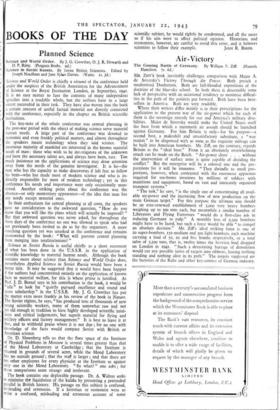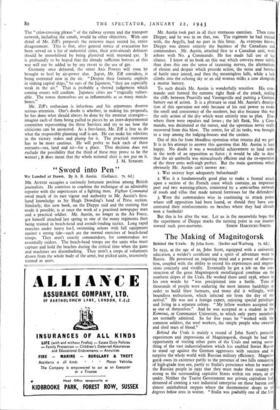Air- Victory
MR. ZIFF'S book inevitably challenges comparison with Major A. de Seversky's Victory Through Air Power. Both preach a modernised Douhetism. Both are full-blooded expositions of the doctrine of the blue-sky school. In both there is discernible some lack of perspective with an occasional tendency to minimise difficul- ties in the path of the projects put forward. Both have been best- sellers in America. Both are very readable.
Where their writers differ mainly is in their prescriptions for the application to the present war of the air-cower which for each of them is the sovereign remedy for our and America's military disa- bilities. Major de Seversky would make the United States itself the base from which a mammoth air assault should be launched against Germany. For him Britain is only—for his purpose—a second best, a makeshift and unsatisfactory substitute, a " way station " to be dispensed with as soon, as the requisite mileage can be built into American bombers. Mr. Ziff, on the contrary, regards Britain as the " ideal base." From it an absolutely overwhelming attack can be made on the Reich. " Air-power alone . . . without the intervention of surface arms is quite capable of deciding the conflict." But the enterprise will be a colossal one and the pre- parations for it will be immense. " They dwindle to small pro- portions, however, when contrasted with the enormous apparatus required for sea-borne invasions by millions of soldiers with munitions and equipment, based on vast and intricately organised transport systems."
" The task," he says, " is the single one of concentrating all avail- able air-power and the increasing flow of new production on the main German target." For this purpose the ultimate aim should be an ever-renewed establishment of 5,000 very heavy bombers weighing up to 30o tons each, but meanwhile a similar number of Liberators and Flying Fortresses " would do a first-class job in reducing Germany to pulp." A monthly loss of 2,50o bombers might have to be faced, but such a force would be able " to compel an absolute decision." Mr. Ziff's ideal striking force is one of 20 super-bombers, iso medium and 300 light bombers, each machine carrying a load of 5o, 20 and five bombs respectively, or a total salvo of 5,5oo tons, that is, twelve times the heaviest load dropped on London in 1941. "Such a devastating barrage of demolition would cut any possible series of targets into ribbons, leaving nothing standing and nothing alive in its path." The targets suggested are the factories of the Ruhr and other key-centres of German industry.
The " criss-crossing plexus " of the railway system and the transport network, including the canals, would be other objectives. With one detail of Mr. ZifFs proposals the reviewer must record his entire disagreement. This is that, after general notice of evacuation has been served on a list of industrial cities, their anti-aircraft defences should be immobilised by being plastered with mustard gas. It is profoundly to be hoped that the already sufficient horrors of this war will not be added to by any resort to the use of gas.
Germany once defeated, the other Axis Powers will soon be brought to heel by air-power also. Japan, Mr. Ziff considers, is being overrated now in the air. " Despite their fantastic exploits in sinking capital ships," he says of the Japanese, " they are especially weak in the air." That is probably a shrewd judgement which coming events will confirm. Japanese cities are " tragically vulner- able. The towns themselves are as inflammable as so many match- boxes."
Mr. Ziff's enthusiam is infectious and his arguments deserve serious attention. One's doubt is whether, in making his proposals, he has done what should always be done by the amateur strategist— imagine each of them being pulled to pieces by an inter-departmental committee representing the three Services and try to see how the criticisms can be answered. As a free-lance, Mr. Ziff is free to do what the responsible planning staff is not. He can make his selection in the victory stakes and plump for it. The practical statesman has to be more cautious. He will prefer to back each of three entrants—sea, land and air—for a place. That decision does not exclude the possibility that the third of these may prove to be the winner; ft does mean that the whole national shirt is not put on it.
J. M. SPAIGHT.



























 Previous page
Previous page